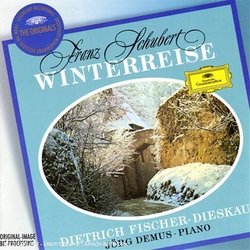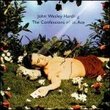| All Artists: Franz Schubert, Dietrich Fischer-Dieskau, Jörg Demus Title: Schubert: Die Winterreise / Fischer-Dieskau Members Wishing: 0 Total Copies: 0 Label: Deutsche Grammophon Release Date: 2/13/1996 Genres: Pop, Classical Style: Vocal Pop Number of Discs: 1 SwapaCD Credits: 1 UPC: 028944742121 |
Search - Franz Schubert, Dietrich Fischer-Dieskau, Jörg Demus :: Schubert: Die Winterreise / Fischer-Dieskau
 | Franz Schubert, Dietrich Fischer-Dieskau, Jörg Demus Schubert: Die Winterreise / Fischer-Dieskau Genres: Pop, Classical
Any great concert singer is likely to have a lifelong obsession with Schubert's greatest song cycle, which tracks the winter journey of a jilted lover wandering into the snow finding ever-greater depths of alienation. Diet... more » |
Larger Image |
CD DetailsSynopsis
Amazon.com essential recording Any great concert singer is likely to have a lifelong obsession with Schubert's greatest song cycle, which tracks the winter journey of a jilted lover wandering into the snow finding ever-greater depths of alienation. Dietrich Fischer-Dieskau seemed to record the piece every 10 years or so, but this 1966 outing is said to be his favorite, and it's easy to understand why. All of his customary intelligence is in full evidence, but the voice is particularly resplendent. While this carries an obvious sensual appeal--and every two minutes or so he does something that takes your breath away--the voice also illuminates his overall interpretive concepts with a clarity that can be achieved perhaps only by a voice in its absolute prime. Particularly gratifying is his emotional directness; later performances could be so refined, so worked over that the emotionalism (such an important part of this piece) seemed more remembered than felt. --David Patrick Stearns Similarly Requested CDs
|
CD ReviewsSo heart-rending, it's almost unbelievable. Superb. Supreme. Ramon Kranzkuper | Gainesville, FL | 06/21/2001 (5 out of 5 stars) "If you are going to purchase a Winterreise recording, let me assure you that having listened to so many, it has to be either this one, or the recording of Fischer-Dieskau, also in 1962, accompanied by Moore. Both pianists - Moore and Demus - work beautifully for Fischer-Dieskau. I might perhaps recommend Moore over Demus, but that is, of course, just my preference, and it is Fischer-Dieskau's performance we're talking about here.First off, one needs to know a little German, or at least follow the translation well, in order to appreciate these Lieder. Fischer-Dieskau brings such a depth of emotion into the music that the lyrics must be followed by the listener, or else much is lost. Vocal expression - emotions expressed in individual words - is more important in "Wintereise" than in many other German Lieder.This "Winterreise" is the most, repeat, the most beautiful rendition of ANY of Schubert's Lieder that I have heard. Someone once reviewed Fisher-Dieskau's 1960s Winterreise saying "it makes you feel like slashing your wrists". True! "Winterreise" is, as Schubert said, morose and devoid of hope; Fischer-Dieskau carries the mood and emotion to the extreme limits, and what we get is such a heart-rending performance, it's almost unbearable. It's also almost unbelievable that a human voice can carry so much emotion.Fischer-Dieskau's voice in this recording is at its best. It is totally spontaneous; it is from the depths of a despondent heart - and yet it is perfect. So perfect, in fact, that it seems that not even a syllable could have been improved!The horror of the waking from the dream - "Es shrieen die Raben vom Dach!"; the resigned yet infinitely pining tone in "wann halt ich mein Liebchen in Arm?"; and most of all, the soul-shaking tremor in the words "Ob wohl auch so reisend schwillt?" -- these stick in the heart. If any one recording opens the ear to Schubert's infinite world of painful beauty, this is the one.One could go on and on about this recording, but to cut a long story short, if you remain unmoved by Fisher-Dieskau's "Winterreise" there is probably very little in classical/romantic music that will ever move you. This is the master-composer at his finest, the human voice at its finest, and music at its finest.To sum up, this is some of the best of Schubert's music on CD you will ever procure. The sound is legendary DG." Heavenly. Robin Friedman | 02/10/1999 (5 out of 5 stars) "Fischer-Dieskau is absolutely the best interpreter of Schubert's lieder. He has the most beautiful baritone I've ever heard, so natural and smooth. And the songs themselves are gorgeous. Fischer-Dieskau, it seems, was born to perform Schubert's work like no one else. A superb recording." Hearing Schubert's Winterreise Robin Friedman | Washington, D.C. United States | 07/03/2006 (5 out of 5 stars) "For reasons I don't fully understand, I have developed a custom over the past several years of listening to Schubert's Winterreise at around the time of the Fourth of July. Perhaps it is the contrast between the hot summer days and the icy, wintery setting of Schubert's songs. In addition, the one-day summer break, encouraging reflection in the midst of a busy year, draws me to Schubert's music. But more so, while occupied with public celebrations, such as fireworks, parades, and company (which I also enjoy), I find it valuable to do something private,pensive, and deeply sad. It is the feeling of being alone. Thus, this year, as in several years past, I have reheard "Winterreise".
Winterreise is a cycle of 24 poems by Wilhelm Muller that Schubert set in 1827, just months before his death. The singer is a man who has just been rejected by a woman he has met in a town to which he has wandered. "A stranger I arrived/ a stranger I depart again", he sings at the outset of the work. The work covers a range of feelings from rejection through loneliness, despondency, self-criticism, anger, dashed hope, thoughts of suicide, heartbreak, and, at the end, madness. It is wrenching music, utterly sad. It captures feelings that those who have been alone will know, regardless of musical sophistication. For all the sadness of the score, I never fail to feel restored upon hearing it. Dietrich Fischer-Dieskau recorded at least seven studio versions of "Winterreise" during a long career. I am most familiar with his recordings with his long-time accompanist, Gerald Moore; but I find that this recording, dating from 1966, with pianist Jorg Demus surpasses the versions with Moore. The phrasing, dramatic power, and passion of Fischer-Dieskau's singing on this recording are extraordinary. In virtually all of these songs, Fischer-Dieskau displays contrasts in the protagonist's mood and feelings. Many of the songs begin with slow and melancholy lines as Fischer-Dieskau works up to climactic passages of fury and despondency and then, frequently, falls back again. He makes great contrast between a declamatory singing style, almost approaching speech, and a flowing lyricism. Demus's accompaniment is smoldering and subdued. He sets the stage for Fischer-Dieskau with the many preludes Schubert composed for the songs, some of which are tone-paintings for the falling of the snow, the coldness of ice, the blowing of the wind, the flying of crows, and the isolation of the heart. Among the songs that moved me on this hearing of "Winterreise" were no. 4, "numbness"; no. 5. "Der Lindenbaum", the most famous work of the cycle; no. 12, "Loneliness"; no. 14. "the hoary head" ; no. 15, the haunting "the crow"; no. 19, "deception" with its heartbreaking line "Ah, anybody as wretched as I/ yields gladly to this bright deceit"; and the two final songs of madness, nos. 23 and 24, "The Phantom Suns" and "The Organ Grinder." Anyone who know what it is to be alone will love "Winterreise" regardless of the time of year. This recording is an unparallelled way to get to know this music. Robin Friedman " |

 Track Listings (24) - Disc #1
Track Listings (24) - Disc #1








